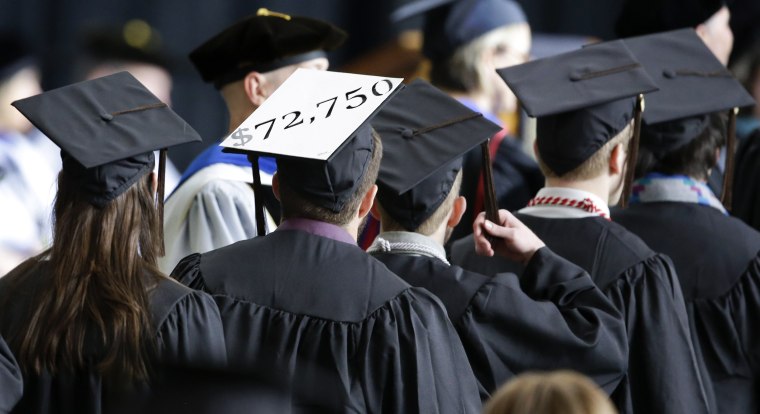Bucking the trend of annual tuition increases, two small private liberal arts colleges are actually cutting tuition next year — by more than 40 percent.
Utica College in New York and Rosemont College in Pennsylvania are calling it a "tuition reset," and attempting to show that good education and affordability aren't necessarily mutually exclusive.
"We've seen prices escalate across the country," Utica President Dr. Todd Hutton told CNBC's "On The Money" in an interview. "We've had escalations and our families simply are hitting a ceiling that they can no longer afford."
Utica and Rosemont's actions buck a national trend of surging tuition. Since the 2008 recession, public university costs have skyrocketed, according to a report this year from the Center on Budget and Policy Priorities.
However, starting next fall, Utica is cutting tuition from about $34,000 this year, to just under $20,000. Meanwhile, Rosemont is dropping its tuition from the current $33,000 to $18,500 next year.
Why College Costs Are High and Rising
All of which raises the question: how does that math work? How can a college cut tuition nearly in half and survive?
"The math is you reduce your tuition and you reduce your discount rate," explains Utica's Hutton, referring to the amount that schools reduce the full tuition "sticker price for individual students.
Rosemont College President Sharon Hirsh told CNBC that the effort was part of an attempt to shift an existing model. "We realized that we, among so many other colleges, were going according to a model that was raising the sticker price at the same time that we had to raise discounts," she said. "And so we've gone from a high sticker price/high discount to a lower sticker price/low discount rate."
4 in 10 Gen Yers Plan to Cover Kids’ College Costs
According to a survey of tuition discounts at private nonprofit four-year schools from the National Association of College and University Business Officers, the average freshman actually pays 48 percent less than the full tuition price. This means about half of the student's tuition and fees are covered by the school through grants and applied discounts.
Yet if the sticker price is dropping, and discounts are reduced in correlation, what will be the actual cash savings to students in a "tuition reset"?
"At Rosemont, the average savings will be $815 over next year," said Hirsh, "but that ranges according to the individual students' packaging anywhere from $100 only to ... $14,000."
Utica's Hutton added that "The entire range of our students will save money. Ninety-three percent per year will save between $1,000 and $5,000 per year. The remainder will save $5,000 and up. The vast majority of our students will save significant dollars in this."
Why Does Community College Leave So Many in Debt?
Yet the move also raised a question about whether Utica and Rosemont's gesture was truly a 40 percent cut, or just transparency in existing pricing. The educators agreed that it represented "both," and explained why.
"Financial aid is very, very complicated for families and we really want the price, the cost of education, to reflect the price as much as we possibly can," said Hutton.
"Transparent was definitely part of our strategy in doing this reset," said Rosemont's Hirsh, pointing to a 2014 Sallie Mae survey where "53 percent of respondents said they would not look beyond sticker price" when looking for schools to consider applying to.
Hirsh described how "we were sitting there realizing that's 53 percent of potential families who are not looking beyond a sticker price that you know is an artificially inflated sticker price."
Read More from NBC News Special Report: Freshman Year
Both schools also deny there is any desperation in the tuition reset move. Hutton points to "15 straight years of record enrollment" at Utica College. Meanwhile, Hirsh says we're "making this decision from a position of strength," and also cited rising attendance, as well as renovations and upgrades to Rosemont College's facilities.
Hutton added that other schools may follow suit. "Every school has to find their own pathway to affordability. But I think every school ought to be looking for ways to hold down costs for families and students."
— "On the Money" airs on CNBC Sundays at 7:00 p.m. ET, or check listings for air times in local markets.
